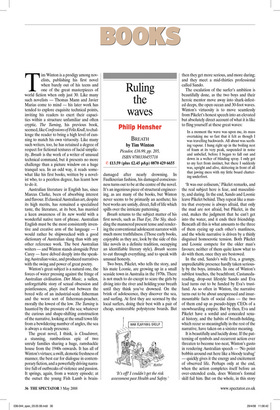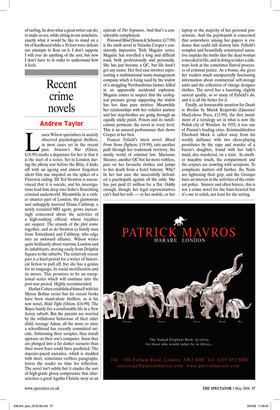Ruling the waves
Philip Hensher
BREATH by Tim Winton Picador, £16.99, pp. 205, ISBN 9780330455718 ✆ £13.59 (plus £2.45 p&p) 0870 429 6655 Tim Winton is a prodigy among novelists, publishing his first novel when barely out of his teens and one of the great masterpieces of world fiction when only just 30. Like many such novelists — Thomas Mann and Javier Marias come to mind — his later work has tended to explore exquisite technical points, inviting his readers to exert their capacities within a structure unfamiliar and often cryptic. The Turning, his previous book, seemed, like Confessions of Felix Krull, to challenge the reader to bring a high level of cunning to match his own virtuosity. Like many such writers, too, he has retained a degree of respect for fictional textures of lucid simplicity. Breath is the work of a writer of unusual technical command, but it presents no more challenge than a picture window on a huge tranquil sea. In an odd way, it reads somewhat like his first books, written by a novelist who, to a peerless degree, has learnt how to do it.
Australian literature in English has, since Marcus Clarke, been of absorbing interest and flavour. If classical Australian art, despite its high merits, has remained a specialised taste, the literature, at its best, has married a keen awareness of its new world with a wonderful native turn of phrase. Australian English must be the most consistently inventive and creative arm of the language — I would rather be shipwrecked with a good dictionary of Australian slang than with any other reference work. The best Australian writers — and Winton stands alongside Peter Carey — have delved deeply into the speaking Australian voice, and produced narratives with the swing and power of great poetry.
Winton’s great subject is a natural one, the forces of water pressing against the fringe of Australian civilisation. Dirt Music, a sullen, unforgettable story of sexual obsession and pointlessness, plays itself out between the bored wife of an industrial-scale fisherman and the worst sort of fisherman-poacher, morally the lowest of the low. The Turning is haunted by the pressure of the sea; whatever the curious and shape-shifting construction of the narrative, looking at the small town life from a bewildering number of angles, the sea is always a steady presence.
The great novel, I think, is Cloudstreet, a stunning, rumbustious epic of two unruly families sharing a huge, ramshackle house from the 1940s onwards. It has all of Winton’s virtues; a swift, demotic freshness of manner, the best ear for dialogue in contemporary fiction, and a powerfully driving narrative full of outbreaks of violence and passion. It springs, again, from a watery episode; at the outset the young Fish Lamb is brain damaged after nearly drowning. In Faulknerian fashion, his damaged consciousness turns out to be at the centre of the novel. It’s an ingenious piece of structural engineering, as are many of the books, but Winton never seems to be primarily an aesthete; his best works are untidy, direct, full of life which spills over the intricate patterning.
Breath returns to the subject matter of his first novels, such as That Eye, The Sky, shedding the mannered present tense and rendering the conventional adolescent narrator with much more truthfulness. (Those early books, enjoyable as they are, look by the side of this like novels in a definite tradition, occupying an identifiable literary style). Breath seems to cut through everything, and to speak with unusual honesty.
Two boys, Pikelet, who tells the story, and his mate Loonie, are growing up in a small seaside town in Australia in the 1970s. There is not much to do except to scare the girls by diving into the river and holding your breath until they think you’ve drowned. On the brink of adolescence, they discover the sea, and surfing. At first they are scorned by the local surfers, doing their best with a pair of cheap, unsteerable polystyrene boards. But then they get more serious, and more daring; and they meet a mid-thirties professional called Sando.
The escalation of the surfer’s ambition is beautifully done, as the two boys and their heroic mentor move away into shark-infested deeps, the open ocean and 30-foot waves. Winton’s virtuosity is to move seamlessly from Pikelet’s honest speech into an elevated but absolutely direct account of what it is like to fling yourself at these great waves:
In a moment the wave was upon me, its mass overtaking me so fast that it felt as though I was travelling backwards. All about was seething vapour. I hung right up in the boiling nest of foam at its very peak, suspended in noise and unbelief, before I began to fall out and down in a welter of blinding spray. I only got to my feet from instinct, but there I suddenly was, upright and alive, skittering in front of all that jawing mess with my little board chattering underfoot.
‘It was our coliseum,’ Pikelet remarks, and the real subject here is fear, and masculinity, and daring. In the end, Sando and Loonie leave Pikelet behind. They repeat like a mantra that everyone is always afraid, that only the mad are not afraid, but Pikelet, in the end, makes the judgment that he can’t get into the water, and it ends their friendship. Beneath all this is what amounts to the three of them eyeing up each other’s manliness, and the whole narrative is driven by a thinly disguised homoerotic tension. Both Pikelet and Loonie compete for the older man’s favours; neither of them quite know what to do with them, once they are bestowed.
In the end, Sando’s wife Eva, a grumpy, unpredictable presence hardly taken seriously by the boys, intrudes. In one of Winton’s subtlest touches, the beachfront, Castanedareading, drop-out lifestyle Sando and Eva lead turns out to be funded by Eva’s trustfund. As so often in Winton, the narrative turns out to be about unexpressed and insurmountable facts of social class — the two of them end up as pseudo-hippy CEOs of a snowboarding empire. But by then, Eva and Pikelet have a sordid and concealed sexual history, and the habits of breath-holding, which recur so meaningfully in the rest of the narrative, have taken on a sinister meaning.
It is beautifully and lucidly done. If the patterning of symbols and recurrent action ever threaten to become too neat, Winton’s gusto in rendering Australian speech — ‘No point bobbin around out here like a bloody teabag’ — quickly gives it the energy and excitement of observed life. Perhaps only at the end, when the action completes itself before an over-extended coda, does Winton’s formal skill fail him. But on the whole, in this story of surfing, he does what a great writer can do; to make us see, while sitting in our armchairs, exactly what it would be like to stand on a bit of hardboard while a 30-foot wave defeats our attempts to float on it. I don’t suppose I will ever do anything of the sort, but now I don’t have to in order to understand how it feels.



















































































 Previous page
Previous page